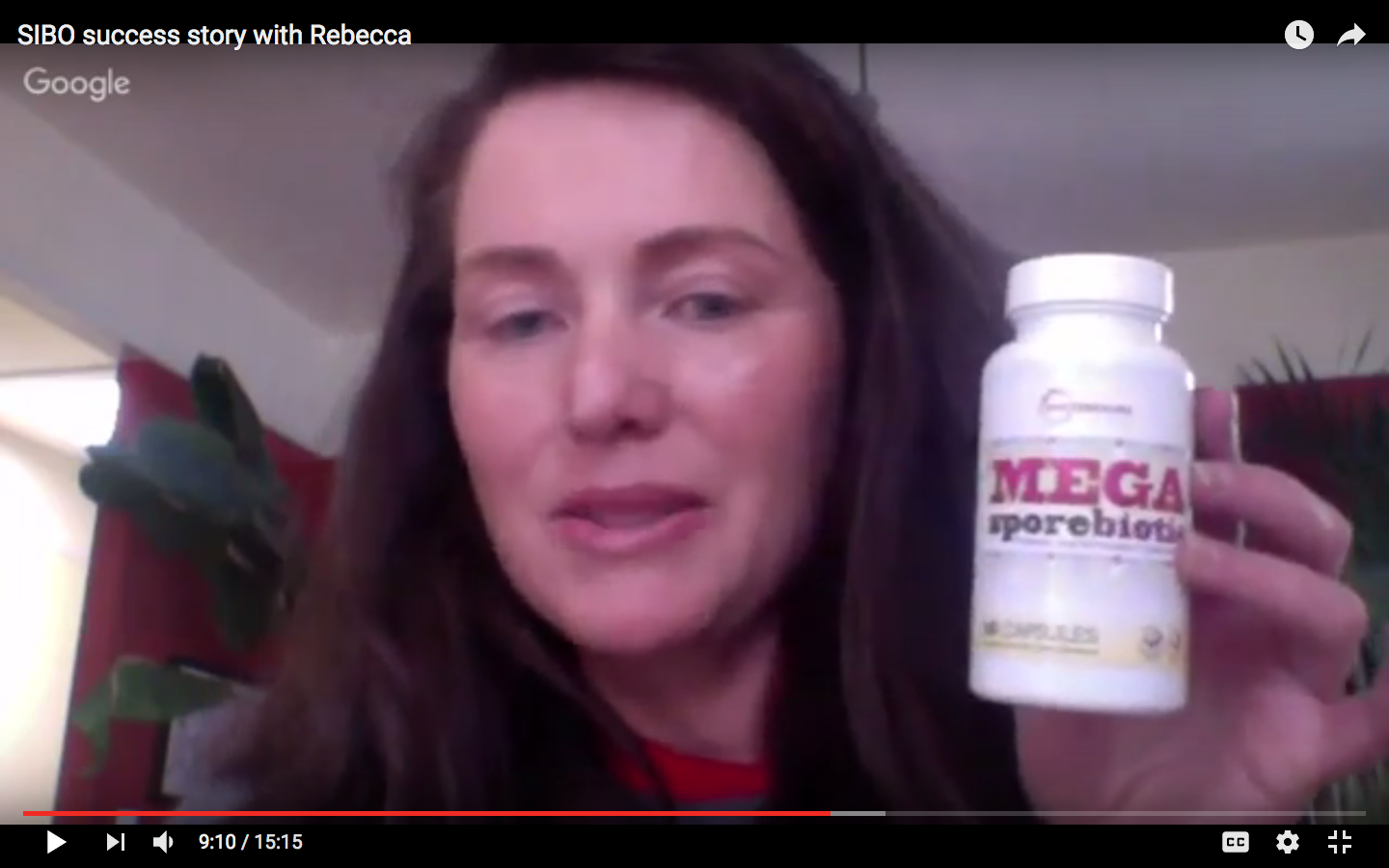Like many of us, Rebecca was diagnosed with IBS by doctors but could not get proper help for it.
Finally, through her own investigation she figured out that her IBS symptoms were caused by a condition called SIBO, which stands for Small Intestinal Bacterial Overgrowth.
While I never had SIBO personally, Rebecca’s IBS success story is similar to mine. A mix of pain, resistance, perseverance, confusion and anxiety but a general determination to do what it takes to feel better. Even if it’s tough or uncomfortable.
She generously agreed to share her recovery story with us and what she’s learned along the way in this 15 minute video.
Below the video, I’ll discuss SIBO in detail, as well as the probiotics that she used.
A brief background on SIBO. It’s one of the most common causes of IBS symptoms such as bloating, gas, abdominal pain, constipation, diarrhea or both. You can test for it using a lactulose breath test (make sure it’s lactulose, because the glucose test is not accurate).
I want to clarify that SIBO, like IBS, is NOT a disease. It’s an imbalance of the digestive system that causes inflammation, malabsorption of nutrients and gassy reactions to fermentable carbohydrates.
Things that cause SIBO are:
- Low stomach acid (can manifest as reflux, GERD, heartburn, or no symptoms at all)
- Slowed motility (even in the case of diarrhea)
- Eating a diet full of refined sugar, gluten, dairy, and processed foods
- Periods of intense or prolonged stress
SIBO is treated by doctors with antibiotics but this is the least effect approach because recurrence rate is very high. And SIBO needs to be treated along with the underlying cause. In other words you don’t just reduce the current population of bacteria, but also focus on improving motility, cleaning up the diet, reducing stress and boosting stomach acid.
Because SIBO is a bacterial issue, the right probiotics can help tremendously. Probiotics are a a tricky subject for SIBO sufferers because their efficacy depends largely on picking the right one. Most probiotics contain lactobacillus and this strain can make SIBO worse.
In the video, Rebecca mentioned the two probiotics that made the most difference for her. They were Megasporbiotic and prescript assist.
These are spore-based probiotics, which makes it easier for them to survive the journey to the small and large intestine in tact. Because they are soil-based they don’t have to be stored in the fridge, will last for 2 years and won’t be killed by hot or cold temperatures. With these probiotics you know you are getting what’s on the label.
With less-stable, refrigerated brands, you never know how many bacteria actually survive the journey from factory to store.
Megasporbiotic is a practitioner-prescribed brand because of it’s strength. I give this probiotic to my SIBO clients with very specific dosage instructions. Never start with one pill per day, that’s way too much.
Here’s what makes megasporbiotic so powerful. It’s both a probiotic and antibiotic in one. The beneficial bacteria spores emit a bacteriacide that kills pathogenic species in the gut and recolonizes with beneficial strains.
I dose conservatively because this product may cause die off symptoms. Unlike broad-spectrum pharmaceutical antibiotics, megasporbiotic won’t wipe out the entire bacterial population, both good and bad, but rather target the bad guys selectively.
While Rebecca did not take any anti-microbial to wipe out SIBO, the megasporbiotic did the trick.
Megasporbiotic is also antifungal, so it’s very effective for candida and other yeasts, which often accompany SIBO infections.
Lastly, megasporbiotic doesn’t have any sketchy ingredients like soy, prebiotics (like inulin) or lactose, which can produce allergic reactions or flare SIBO symptoms in sensitive folks.
For example, Jaro Dophilus, Florastor and Align contain dairy and lactose. Jarrow Ideal Bowel Support contains soy and Culturelle has prebiotics.
So to sum up, Rebecca used the powerful trifecta of the right probiotics, bone broth and emotional/mental work to recover from IBS and SIBO after two decades of suffering. She also followed the right diet to starve the bacteria.
Whether you have SIBO or not, Rebecca’s message is hopeful and helpful. Rebecca’s story stresses the importance of emotional work, mindset and stress management in tackling IBS and SIBO. This is just as important as testing, diet, supplements and probiotics.
IBS is an invitation to explore what’s not working for you in your life and find a way to fix it, end it or accept it.


